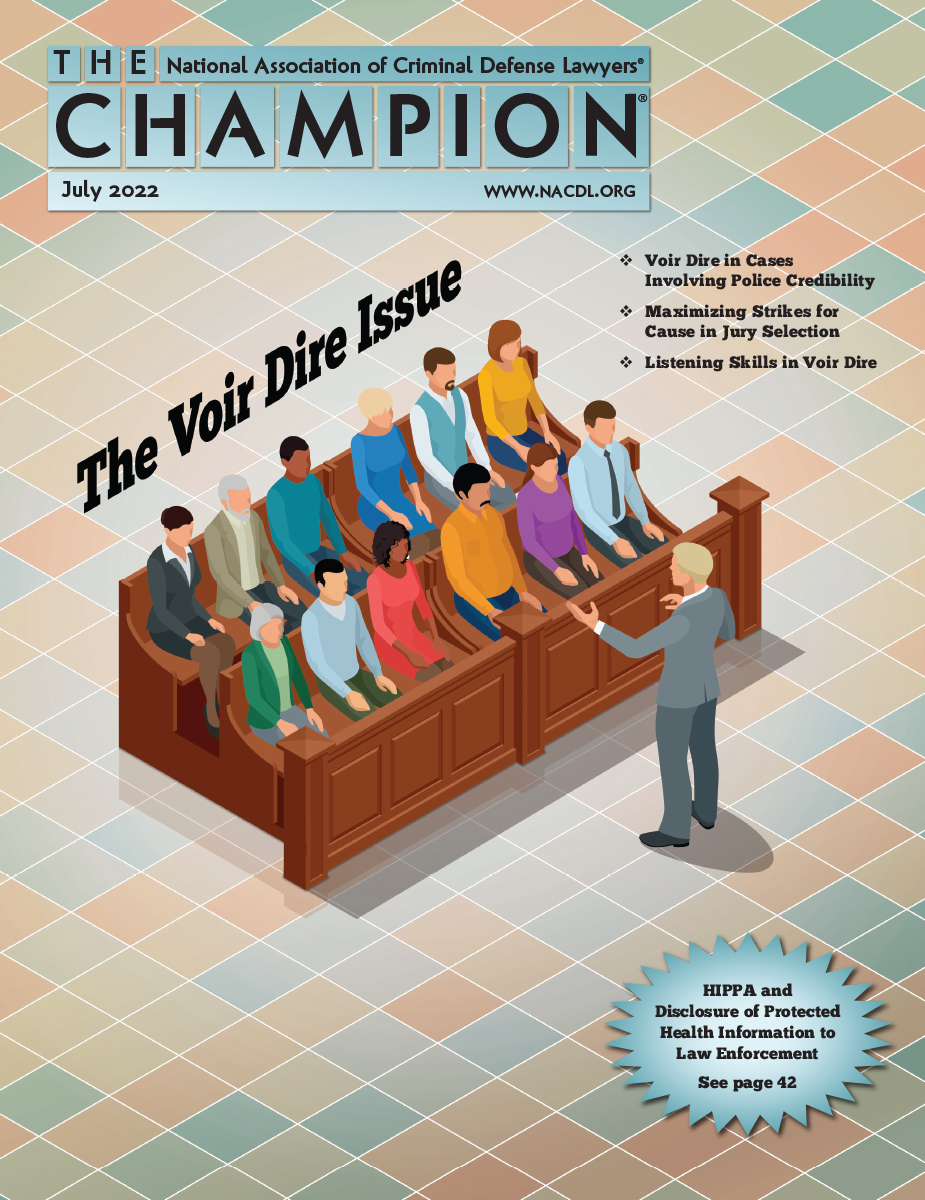July 2022

How can defense lawyers increase the number of strikes for cause they obtain during voir dire?
Articles in this Issue
-
Affiliate News
What events are NACDL affiliates hosting this month? Find out here.
-
Book Review: A Shot in the Moonlight by Ben Montgomery
This month Tucker Carrington reviews A Shot in the Moonlight: How a Freed Slave and a Confederate Soldier Fought for Justice in the Jim Crow South by Ben Montgomery.
-
Book Review: American Contagions by John Fabian Witt
This month John L. Kane reviews American Contagions: Epidemics and the Law from Smallpox to COVID-19 by John Fabian Witt.
-
Book Review: Free Justice by Sara Mayeux
This month Patrick Boylan reviews Free Justice: A History of the Public Defender in Twentieth-Century America by Sara Mayeux.
-
Cross Country: Impeachment by Behavior Inconsistent With Witness’s Story
How can defense counsel impeach witnesses when they exhibit behavior that is inconsistent with their stories?
-
From the President: Criminal Justice, Electoral Justice, and NACDL
Should criminal defense attorneys consider electoral and political stability to be a criminal justice issue?
-
It’s No Secret: The Destruction of Electronic Data by Law Enforcement Is a Frequent Problem
for Criminal Defendants
Wholesale destruction of communications evidence on agents’ cellphones and elsewhere is something that criminal defendants and their lawyers face with shocking regularity.
-
Maximizing Strikes for Cause in Criminal Cases
Jury consultant Robert Swafford writes that by carefully drafting questions and appropriate follow-up questions, lawyers can significantly increase the number of strikes for cause they obtain during voir dire. Swafford utilizes loaded questions, which are questions that make it easy for a juror to express opinions that result in the juror being struck for cause.
-
NACDL News: NACDL Condemns Supreme Court Decision Undermining the Right of Habeas Corpus
NACDL News for July 2022
-
NACDL News: Nation’s Criminal Defense Bar Remembers Past President Frank Maloney
NACDL News for July 2022
-
NACDL News: On the Second Anniversary of George Floyd’s Murder, A Call for Renewed Focus on Reform
NACDL News for July 2022
-
NACDL News: Statement Concerning the Presumption of Innocence and Presumption of Pretrial Release
NACDL News for July 2022
-
Search & Seizure Commentary: The Open Fields Doctrine, a Herd of Cattle, and Exigent Circumstances
The open fields doctrine is an exception to the Fourth Amendment prohibition on unreasonable searches, not seizures. While police officers can lawfully search a person’s property under the open fields doctrine, that doctrine does not speak to whether they can seize items they see.
-
The HIPAA Privacy Rule and Disclosures of Health or Medical Information to Law Enforcement
The HIPAA Privacy Rule generally prohibits the disclosure of health and medical information without an individual’s authorization. However, the rule contains exceptions that aim to balance the right of privacy in one’s medical information with important public interests. When can medical information be disclosed to law enforcement? How does the law enforcement exception apply in DUI cases?
-
Voir Dire in Cases Involving Police Credibility
If police credibility is a critical issue at trial, the defense needs jurors to believe one of two possibilities – the police officers are not credible either because they are mistaken or because they are dishonest. Are the prospective jurors open to the idea that police officers will lie under oath? What hypotheticals can defense counsel use to educate the members of the venire while simultaneously searching for cause challenges?
-
What Are They Really Saying? Listening Skills in Voir Dire
During voir dire, the most important concern for criminal defense attorneys is getting prospective jurors to express true feelings. In the quest for a juror’s truth, defense counsel must create a connection with that juror. Jason Sosa writes that the key to success in voir dire is reflective listening, which involves defense counsel trying to understand a juror’s viewpoint and then communicating that perspective back to the juror to assure the juror that it was understood.
